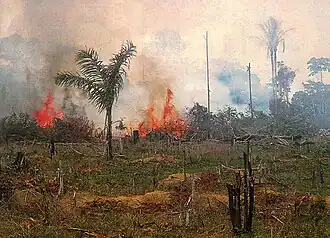Firewood in Nigeria
.jpeg)
In Nigeria, firewood is a traditional source of energy for domestic and commercial use.[1][2][3] Fuel wood is derived from cutting and burning wood materials such as logs and twigs.[4][5][6][7] It has long been prevalent among rural and sometimes urban dwellers.[8]
In Nigeria, as in numerous other developing nations, a significant portion of the population lacks access to modern energy alternatives.[9][10][11] Consequently, they heavily depend on traditional biomass fuels such as crop waste and wood to fulfill their basic energy requirements, particularly for home and commercial cooking purposes.[12][13][14][15][16]
This reliance on fuel wood has implications for deforestation, as the unsustainable harvesting of wood for fuel contributes to the degradation of forests and the loss of biodiversity. The excessive demand for fuel wood places immense pressure on forest resources, leading to the depletion of woodlands and the disruption of delicate ecosystems. Furthermore, deforestation exacerbates climate change by releasing carbon dioxide, a greenhouse gas, into the atmosphere.[8] This approach would not only aid in biodiversity conservation but also contribute to the expansion of national vegetation cover.
Use of fuel wood
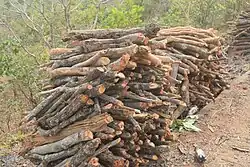
Fuel wood is commonly obtained and utilized in different forms. Round wood is commonly sold and used for domestic purposes, including in stores and open fires. Split logs, on the other hand, are predominantly utilized for commercial and industrial needs. In rural areas, small twigs and thin materials are typically not sold but are often used as fuel, either at a low cost for free.[17] The production of fuel wood generally requires minimal capital investment, with basic tools such as an axe or machete being the primary requirements. In cases where large trees need to be harvested, methods like ring girdling or burning at the base may be employed to kill the trees, allowing them to dry out before use. Many farmers view fuel wood as a readily available resource that does not require any financial transaction, often relying on their existing farm tools for its collection.[17]
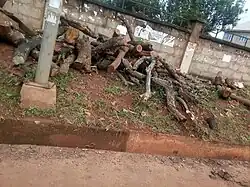
Fuel wood in Nigeria is used for various purposes due to its availability and affordability. Here are some common uses of fuel wood in Nigeria:
- Cooking: Fuel wood serves as a primary source of energy for cooking in many households and commercial outlets across Nigeria. It is used in traditional stoves or open fires to prepare meals and heat food.[18]
- Heating: In colder regions or during colder seasons, fuel wood is used for heating purposes. It provides warmth in homes and can be used in fireplaces or traditional heating devices.[19]
- Small-scale industries and artisanal activities: Fuel wood is often utilized by small-scale industries for various production processes. Examples include baking and food processing, pottery making, brick-making, and blacksmithing.[20] In rural areas, fuel wood is used for artisanal activities such as carving, woodworking, and crafting traditional items.[21]
- Charcoal production: Fuel wood is also a key raw material for charcoal production. Charcoal, derived from the carbonization of wood, is used for cooking, heating, and industrial processes.[22][23]
- Campfire, cultural and religious practices: Fuel wood plays a role in cultural and religious practices in Nigeria. It is used for traditional ceremonies, rituals, and religious ceremonies involving fire.[24]
-
 Firewood is commonly processed by axing and cutting it into smaller pieces for cooking purposes
Firewood is commonly processed by axing and cutting it into smaller pieces for cooking purposes -
 Fuel wood used for cooking
Fuel wood used for cooking -
.jpg) Firewood for heating/warming
Firewood for heating/warming -
 Firewood for artisanal activities
Firewood for artisanal activities -
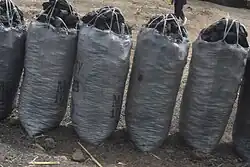 Charcoal for retail or wholesale purposes
Charcoal for retail or wholesale purposes
Environmental impacts of fuel wood utilization
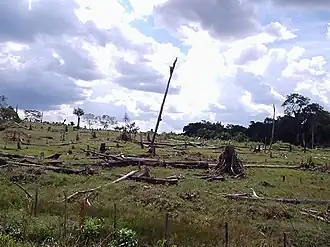
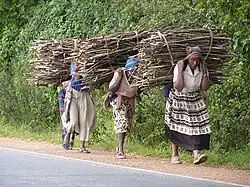
Fuel wood utilization in Nigeria has significant environmental impacts, which include deforestation and loss of forest ecosystems, air pollution, loss of biodiversity, soil erosion and land degradation, water resource depletion, disruption of local ecosystems and associated health concerns, as well as contributing to climate change through carbon emissions.[25][26][27]
Government policies and initiatives to reduce fuel wood use
The Nigerian government has implemented various policies and initiatives to reduce fuel wood use, addressing the environmental and social challenges associated with its utilization. These efforts aim to conserve forests, improve energy efficiency, and transition to alternative energy sources.
Forest conservation and management strategies
To address deforestation and the loss of forest ecosystems caused by fuel wood utilization, the Nigerian government has implemented forest conservation and management strategies, such as the National Forest Policy. The National Forest Policy for the sustainable utilization of Nigeria's forest resources was introduced during the commemoration of the International Day of Forests in 2022. The policy was launched in Abuja, the capital of Nigeria.[28] Other strategies include the establishment of protected areas, national parks, and forest reserves to safeguard valuable forest resources.[29] The government collaborates with local communities, Non-Governmental Organizations (NGOs), and other stakeholders to develop sustainable forest management plans, promoting responsible harvesting practices and reforestation initiatives. By enforcing regulations and raising awareness about the importance of forest conservation, the government strives to preserve the ecological integrity and biodiversity of Nigerian forests.[30]
Promotion of efficient cooking technologies
.jpg)
The promotion of efficient cooking technologies is a key aspect of the government's efforts to address the environmental and health concerns associated with fuel wood utilization. Traditional cooking methods, such as open fires and rudimentary stoves, are highly inefficient and contribute to high levels of smoke and indoor air pollution.[31] The government promotes the adoption and distribution of these efficient cooking technologies through awareness campaigns, subsidies, and partnerships with NGOs and private sector entities. On October 5, 2021, the Federal Government of Nigeria joined forces with key stakeholders to ensure the successful implementation of Nationally Determined Contributions (NDCs) aimed at promoting the adoption of clean and efficient cooking technologies throughout the country.[31]
Alternative energy sources and transitioning away from fuel wood
Recognizing the need to transition away from fuel wood as a primary source of energy, the Nigerian government is actively promoting the use of alternative energy sources. This includes promoting the adoption of clean and renewable energy technologies such as solar power, wind energy, and biogas.[32] In August 2022, Nigeria introduced its Energy Transition Plan. The plan encompasses key sectors such as power, cooking, oil and gas, transport, and industry. Vice President Yemi Osinbajo, along with other stakeholders in the energy sector, unveiled the plan, which outlines Nigeria's roadmap towards achieving net-zero emissions by 2060.[33] By diversifying the energy mix and reducing reliance on fuel wood, the government aims to mitigate deforestation, improve air quality, and contribute to climate change mitigation efforts.[34]
Progress toward sustainable energy practices in Nigeria
The future outlook for energy practices in Nigeria is gradually shifting towards more sustainable alternatives, aiming to address the environmental, social, and economic challenges associated with fuel wood utilization. Efforts are being made to promote cleaner energy sources, improve energy efficiency, and foster sustainable practices in the country.[34]
To ensure a sustainable future, there is also a need to prioritize sustainable forest management and conservation efforts. This involves implementing robust policies and regulations to prevent illegal logging, deforestation, and degradation of forest ecosystems.[35] By promoting responsible and sustainable forest practices, which includes but not limited to, responsible harvesting practices, reforestation initiatives, Nigeria can protect its valuable forest resources, preserve biodiversity, and mitigate the adverse impacts of fuel wood utilization.[36][37]
Community engagement, education, and awareness programs are crucial for fostering a culture of forest conservation and sustainable resource use. The Green Vision for Community Development Initiative (GVCDI), a Non-Governmental Organization (NGO), provided training to community members in Cross Rivers State on forest protection techniques to combat deforestation.[38] In 1981, the Ekuri community in Nigeria, independently conceptualized a formal community forest management initiative. Their aim was to ensure the preservation of their heritage, sustain livelihoods, foster community development, reduce poverty, and prevent the negative consequences experienced by other communities that had lost their forests. This initiative was born out of the community's internal motivation and foresight, without any external influence.[39]
One of the key focus areas for a sustainable energy transition in Nigeria is the promotion of renewable energy sources. The government, in collaboration with private sector entities and international partners, is investing in renewable energy infrastructure.[31] These sources offer significant potential to diversify the energy mix, reduce greenhouse gas emissions, and provide access to clean and affordable energy, particularly in rural areas.[33]
In parallel with the transition to renewable energy, enhancing energy efficiency is another crucial aspect of sustainable energy practices. Improving energy efficiency in sectors such as residential, commercial, agricultural, and industrial areas can contribute to reducing energy demand and optimizing resource utilization. This includes the promotion of energy-efficient appliances, building design and insulation standards, and the implementation of energy management systems.[40] By adopting energy-efficient technologies and practices, Nigeria can reduce energy waste, lower energy costs, and lessen the environmental impact associated with energy consumption.[41]
See also
References
- ^ Kabir, Ibrahim; Wando, Shalom Wunukhen; Abdulsamad, Ahmad; Saddiq, Lukman Shiji; Adamu, Abdullahi (2019). "Knowledge Regarding Adverse Effects of Plastic Bags Usage and ITS Associated Factors Among Consumers in Bauchi Metropolis, Nigeria". International Journal of Public Health and Clinical Sciences. 6 (3). doi:10.32827/ijphcs.6.3.179.
- ^ Afonne, C.; Ojo, T.O. (August 2018). "Sociodemographic factors associated with malaria parasitaemia among under-fives in Nigeria: Evidence from National Malaria Indicator Survey (NMIS), 2015". International Journal of Infectious Diseases. 73: 93. doi:10.1016/j.ijid.2018.04.3635.
- ^ "Annexes". Consumption Tax Trends 2016. 2016. doi:10.1787/g2487684c3-en. ISBN 978-92-64-26404-5.
- ^ Tillman, D.A.; Jamison, R.L. (January 1982). "Cogeneration with wood fuels: A review". Fuel Processing Technology. 5 (3–4): 169–181. Bibcode:1982FuPrT...5..169T. doi:10.1016/0378-3820(82)90013-3.
- ^ Ugwusihiwu, Boniface Obi; Uke, Samuel Obinna; Ugwu, Samson Nnnaemeka; Nwakaire, Joel Nweze; Nwoke, Achuka Oji (2019). "Wood Biomass Utilization and Consequence Environmental Challenges in Nigeria- A Review". 2019 Boston, Massachusetts July 7- July 10, 2019. 2019 Boston, Massachusetts July 7- July 10, 2019. doi:10.13031/aim.201900070.
- ^ Abah, D.; Umeonuora, T. G.; Jimehena, T. S. (June 2020). "Economic Analysis of Fuel Wood Consumption in Guma Local Government Area of Benue State, Nigeria". Journal of Agripreneurship and Sustainable Development. 3 (2): 90–100. doi:10.59331/jasd.v3i2.122.
- ^ Abanikannda, J.O.; Dantani, A. (4 November 2021). "Fuel Wood Exploitation and Sustainable Forest Management". Journal of Applied Sciences and Environmental Management. 25 (6): 987–993. doi:10.4314/jasem.v25i6.16.
- ^ a b Ijeomah, Hm; Ijeomah, Ud; Okagbare, Oh (8 November 2013). "Ecological Survey of Avifaunal Resources in University of Port Harcourt, Nigeria". Ethiopian Journal of Environmental Studies and Management. 6 (6). doi:10.4314/ejesm.v6i6.8.
- ^ Mohammed, Y.S.; Mustafa, M.W.; Bashir, N.; Mokhtar, A.S. (June 2013). "Renewable energy resources for distributed power generation in Nigeria: A review of the potential". Renewable and Sustainable Energy Reviews. 22: 257–268. Bibcode:2013RSERv..22..257M. doi:10.1016/j.rser.2013.01.020.
- ^ North, Douglass C; Wallis, John Joseph; Webb, Steven B; Weingast, Barry R (2007). Limited Access Orders in the Developing World: A New Approach to the Problems of Development (Report). Policy Research Working Papers. doi:10.1596/1813-9450-4359. hdl:10986/7341.
- ^ Haenel, H. (January 1976). "Alternative Approaches to Meeting Basic Health Needs in Developing Countries. A Joint UNICEF/WHO Study. Herausgegeben von V. Djukanovic und E. P. Mach. 116 Seiten, 5 Tab. WHO Genf 1975. Preis: 24,— sfrs". Food / Nahrung. 20 (10): 930–931. doi:10.1002/food.19760201021.
- ^ Ghazoul, J.; Evans, J. (2004). "SUSTAINABLE FOREST MANAGEMENT | Causes of Deforestation and Forest Fragmentation". Encyclopedia of Forest Sciences. pp. 1367–1375. doi:10.1016/b0-12-145160-7/00018-1. ISBN 978-0-12-145160-8.
- ^ Ibitoye, Francis I (2013-10-17). "The millennium development goals and household energy requirements in Nigeria". SpringerPlus. 2 (1): 529. doi:10.1186/2193-1801-2-529. PMC 3825065. PMID 24255832.
- ^ Itodo, Isaac Nathaniel; Bala, Eli Jidere; Sambo, Abubakar Sani (2021). "Renewable Energy Policies and Standards in Nigeria". Biogas Technology in Nigeria. pp. 85–90. doi:10.1201/9781003241959-12. ISBN 978-1-003-24195-9.
- ^ Sokan-Adeaga, Adewale Allen; Ana, Godson R.E.E. (2015). "A comprehensive review of biomass resources and biofuel production in Nigeria: potential and prospects". Reviews on Environmental Health. 30 (3): 143–162. doi:10.1515/reveh-2015-0015. PMID 26351798.
- ^ Kaygusuz, K. (February 2011). "Energy services and energy poverty for sustainable rural development". Renewable and Sustainable Energy Reviews. 15 (2): 936–947. Bibcode:2011RSERv..15..936K. doi:10.1016/j.rser.2010.11.003.
- ^ a b Orimoogunje, Oluwagbenga O.I.; Asifat, Janet (2015). "Fuel Wood Consumption and Species Degradation in South-Western Nigeria: The Ecological Relevance". Journal of Landscape Ecology. 8 (1): 56–68. doi:10.1515/jlecol-2015-0004.
- ^ Matemilola, Saheed; Elegbede, Isa O.; Kies, Fatima; Yusuf, Gbolahan A.; Yangni, Ganbobga N.; Garba, Ibrahim (2019). "An Analysis of the Impacts of Bioenergy Development on Food Security in Nigeria: Challenges and Prospects". Environmental and Climate Technologies. 23 (1): 64–83. Bibcode:2019SJRUE..23...64M. doi:10.2478/rtuect-2019-0005. hdl:10281/236662.
- ^ Bowyer, J.L. (2001). "Wood: Future Availability". Encyclopedia of Materials: Science and Technology. pp. 9637–9641. doi:10.1016/b0-08-043152-6/01746-0. ISBN 978-0-08-043152-9.
- ^ Sola, Phosiso; Cerutti, Paolo Omar; Zhou, Wen; Gautier, Denis; Iiyama, Miyuki; Schure, Jolien; Chenevoy, Audrey; Yila, Jummai; Dufe, Vanessa; Nasi, Robert; Petrokofsky, Gillian; Shepherd, Gill (13 February 2017). "The environmental, socioeconomic, and health impacts of woodfuel value chains in Sub-Saharan Africa: a systematic map". Environmental Evidence. 6 (1): 4. Bibcode:2017EnvEv...6....4S. doi:10.1186/s13750-017-0082-2. hdl:10568/94158.
- ^ Morgan, W.B. (1978). "Development and the fuelwood situation in Nigeria". GeoJournal. 2 (5): 437. Bibcode:1978GeoJo...2..437M. doi:10.1007/bf00156221.
- ^ "Wood energy". www.fao.org. Retrieved 2023-05-21.
- ^ Wood, T S; Baldwin, S (1985). "Fuelwood and Charcoal Use in Developing Countries". Annual Review of Energy. 10 (1): 407–429. doi:10.1146/annurev.eg.10.110185.002203.
- ^ Akintan, Oluwakemi; Jewitt, Sarah; Clifford, Mike (June 2018). "Culture, tradition, and taboo: Understanding the social shaping of fuel choices and cooking practices in Nigeria". Energy Research & Social Science. 40: 14–22. Bibcode:2018ERSS...40...14A. doi:10.1016/j.erss.2017.11.019.
- ^ Schramm, Gunter; Warford, Jeremy J. (1989). Environmental Management and Economic Development. World Bank. ISBN 978-0-8018-3950-4.
- ^ Alhassan, Joseph; Ofosu, Andrews; Iddrisu, Suale; Kofi Garsonu, Emmanuel (3 July 2023). "Wood Fuel Producers' Insight on the Environmental Effects of Their Activities in Ghana". Journal of Sustainable Forestry. 42 (6): 607–623. Bibcode:2023JSusF..42..607A. doi:10.1080/10549811.2022.2053162.
- ^ Nwaka, Ikechukwu D.; Uma, Kalu E.; Ike, George Nwokike (December 2020). "Determinants of household fuel choices among Nigerian family heads: are there gender-differentiated impacts?". Environmental Science and Pollution Research. 27 (34): 42656–42669. Bibcode:2020ESPR...2742656N. doi:10.1007/s11356-020-09554-x. PMID 32712942.
- ^ Nliam, Amaka (2022-04-08). "Nigeria launches National Forest Policy". Voice of Nigeria. Retrieved 2023-05-21.
- ^ Hyman, Eric L. (1993-01-01). "Forestry policies and programmes for fuelwood supply in Northern Nigeria". Land Use Policy. 10 (1): 26–43. Bibcode:1993LUPol..10...26H. doi:10.1016/0264-8377(93)90028-9. ISSN 0264-8377.
- ^ Ozor, N; Odo, P (2008-05-13). "Community Strategies For The Conservation And Preservation Of Forest Resources In Nsukka Agricultural Zone Of Nigeria". Agro-Science. 7 (1). doi:10.4314/as.v7i1.1580. ISSN 1119-7455.
- ^ a b c Simire, Michael (2021-10-05). "Govt collaborates with stakeholders to promote clean, efficient cooking technologies – Minister". EnviroNews Nigeria. Retrieved 2023-05-21.
- ^ "Is Nigeria Ready for Low-carbon Energy Transition? – THISDAYLIVE". www.thisdaylive.com. Retrieved 2023-05-21.
- ^ a b "Tackling the Challenges of Nigeria's Energy Transition Plan – THISDAYLIVE". www.thisdaylive.com. Retrieved 2023-05-21.
- ^ a b Eweka, Ebuwa Elisabeth; Lopez-Arroyo, Enrique; Medupin, Christian Oluwaremilekun; Oladipo, Abiola; Campos, Luiza Cintra (2022-07-29). "Energy Landscape and Renewable Energy Resources in Nigeria: A Review". Energies. 15 (15): 5514. doi:10.3390/en15155514. ISSN 1996-1073.
- ^ Okunlola, Oa; Akinyele, Ao (2015-08-12). "Sustainable management of the Nigerian forests for poverty alleviation". Journal of Agriculture, Forestry and the Social Sciences. 12 (1): 176. doi:10.4314/joafss.v12i1.19. ISSN 1597-0906.
- ^ Ogana, Temitope Elizabeth (2022-06-22). "Joint Forest Management: A Potential Option for Restoring Degraded Forest Reserves in Nigeria". Forestist. doi:10.5152/forestist.2022.22006. ISSN 2602-4039. S2CID 249966290.
- ^ Hall, John B. (1991). "Trees of Nigeria". Forest Ecology and Management. 44 (2–4): 292–293. doi:10.1016/0378-1127(91)90016-o. ISSN 0378-1127.
- ^ "Group empowers community on forest protection". The Guardian Nigeria News - Nigeria and World News. 2021-05-06. Retrieved 2023-05-21.
- ^ "Nigera: A unique example of community based forest management at the Ekuri community | World Rainforest Movement". www.wrm.org.uy. Retrieved 2023-05-21.
- ^ Udale Hussaini, Ibrahim (2019-02-20), Eyvaz, Murat; Gok, Abdülkerim; Yüksel, Ebubekir (eds.), "Households' Energy Efficiency Practices in a Bereft Power Supply Economy of Nigeria", Energy-Efficient Approaches in Industrial Applications, IntechOpen, doi:10.5772/intechopen.81408, ISBN 978-1-78985-519-7, S2CID 169738645, retrieved 2023-05-21
- ^ Oyedepo, Sunday Olayinka (2012). "Energy and sustainable development in Nigeria: the way forward". Energy, Sustainability and Society. 2 (1): 15. Bibcode:2012ESusS...2...15O. doi:10.1186/2192-0567-2-15. ISSN 2192-0567. S2CID 256232531.
